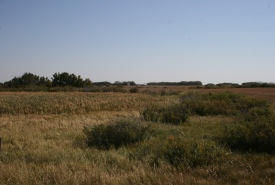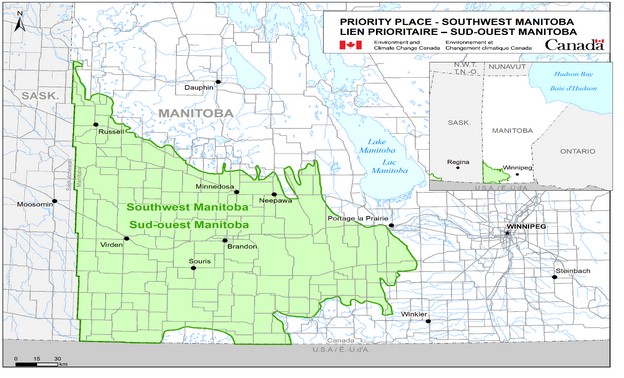Southwest Manitoba Priority Place

Prairie pothole wetlands, West Souris Mixed-grass Prairie Natural Area, Manitoba (Photo by NCC)
What are Priority Places?
Priority places are regions whose habitats make them especially important for species at risk and biodiversity, and that have existing opportunities for collaborative and impactful conservation efforts. The borders of each priority place were chosen by Environment and Climate Change Canada (ECCC) in collaboration with its associated provincial government.
Unlike many conservation plans, which are written either for a single species or for much smaller geographic scales, conservation planning through priority places balances the conservation needs of numerous species at risk and habitats across a wide geographic scale.
What is the SWMPP?
The Southwest Manitoba Priority Place (SWMPP) initiative is a collaborative conservation planning initiative led by the Nature Conservancy of Canada (NCC) and ECCC in partnership with communities, governments, and conservation organizations. Tied to southwestern Manitoba (see map above), its programming will promote shared, multi-partner conservation efforts for species at risk.
Collabrative and community-oriented, this program coordinates new and ongoing conservation efforts among communities across the region, recognizing the importance of local perspectives, values, and needs. Decision-making associated with this program is inclusive and draws on knowledge-sharing and collaborative planning sessions.

What is the goal of the SWMPP?
The goal of the SWMPP initiative is to create lasting, community-driven species at risk and biodiversity conservation outcomes by coordinating the conservation efforts of communities, governments, and conservation organizations in southwestern Manitoba.
What did the SWMPP’s community engagement look like?
Staff from NCC and ECCC hosted community engagement workshops in nine southwestern Manitoba communities in 2023. Each meeting included a facilitated discussion on local community and conservation priorities, identifying local goals, barriers, and strategies for conservation.
The initiative will also include a joint community relations (JCR) team, composed of community members and organizations in the southwest Manitoba region. This team will help share news and important information about the initiative and increase community engagement in the project.
What is the project structure and timeline?
The team hosted community workshops throughout 2023, and these conversations were then summarized into report documents. These reports will inform the draft conservation document which will be completed in the spring of 2024. Over the same time period, NCC staff have worked with a marketing firm and polling team to develop JCR resources, including a website and an in-depth review of community perspectives on conservation.
Read the reports here and here.
What was discussed at the community workshops?
- local species-at-risk conservation efforts;
- what aspects of nature are particularly valued by the community;
- potential programs that would be well-received in the area;
- perspectives on local conservation initiatives; and
- components of the SWMPP conservation plan that would be especially useful
How does this project contribute to my community’s well-being?
Through the priority actions outlined in the plan, the conservation of important species at risk habitat will have positive effects for both nature and people.
The SWMPP initiative will create a conservation plan that puts communities at the forefront of its efforts. There are many benefits to people that result from species at risk conservation, including ecosystems services such as water filtration and retention, and carbon sequestration. Another benefit is continued access and connection to nature for locals and visitors.
How will my (community’s) voice be heard?
We met with dozens of community members, organizations, and government officials this past year, and are excited to share the input we received. To learn more about the input of a meeting near your community, check out the workshop report here. If you were unable to make it to a community workshop during 2023, feel free to contact our team.
What are the next steps after community input is obtained?
Now that the community workshops are finished, our team is summarizing each meeting into a report that captures the suggestions made and the conversations that took place. Collectively, these reports are being used to inform a draft conservation plan and a community engagement strategy. We hope that by integrating community input and promoting ongoing collaboration that species at risk conservation in southwestern Manitoba will benefit both the participating communities and local nature.
I was unable to attend a workshop – how can I be involved?
Even though the community workshop phase is over, there are still opportunities to be involved! We are actively looking for folks to join our JCR team. This team will establish a community engagement strategy to complement the conservation plan being drafted this spring. The JCR team will ensure that community perspectives are actively taken into consideration, and that SWMPP programming builds community through a spirit of collaboration and reconciliation.
The community relations strategy written by the JCR team will be a crucial tool for growing partnerships in the region and sharing information about the project. The JCR team will bring people together with common interests and strengthen trust and confidence in the conservation work being done in the priority place.
Other advisory groups will be established to provide guidance and expertise on relevant and specific conservation themes of interest.
How can I stay updated on the project?
The best place to learn more about the project is right here. In the coming months, we will be adding a dedicated website, hosted by the joint community relations team, and add the link here when it is available.
Contact
Steven Anderson
Conservation Operations Program Coordinator
Nature Conservancy of Canada
steven.anderson@natureconservancy.ca





